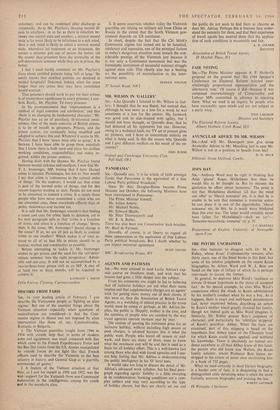THE PSYCHE UNCHAINED .
SIR,—One hesitates to disagree with Dr. M. R. Ridley, whose Keats' Craftsmanship remains, after thirty years, one of the finest books in this field; but some of his relative judgments on the recent Keats biographies by Aileen Ward and W. ,J. Bate are based on the type of fallacy of which he is perhaps over-ready to accuse the former.
In general, he deplores Miss Ward's 'readiness to elevate ill-based hypothesis to the status of accepted fact.' As his special example, he cites Miss Ward's conjectures about the shock to Keats administered by his mother's conduct when he was a boy. As it happens, there is exact and well-based documentary fact, never examined before, describing an action by Keats's mother which greatly shocked her family, though not indeed quite as Miss Ward imagines it. Similarly, Dr. Ridley praises , Bate's judgment of character, and particularly his 'relentless stripping' of. Keats's guardian. Abbey. When the facts are examined, part of this stripping is based on the hypothesis that Abbey knew of the Chancery fund for which Keats could have applied, and withheld his knowledge. There is absolutely no factual evi- dence anywhere at all that Abbey knew of this fund; the person who did know was Walton, the Keats family solicitor, whom Professor Bate leaves un- stripped to the extent of never once mentioning him in a book of 732 pages.
What we need certainly in most literary biography is a harder core of fact; it is disquieting to find a distinguished critic devaluing what is often the more factually accurate biography and praising the less.
44 Westgate, Chichester
ROBERT CUTTINGS


































 Previous page
Previous page